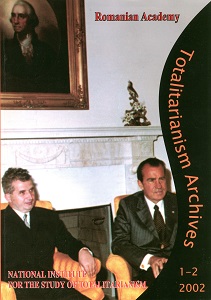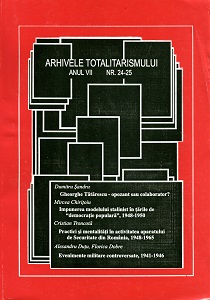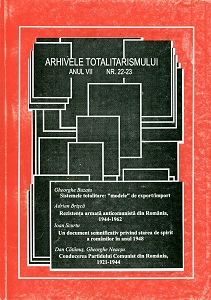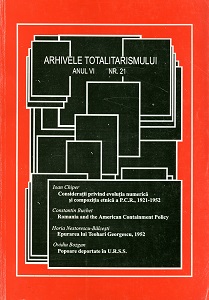The First Brezhnev-Ceaușescu Confrontation Moscow, September, 1965
Author(s): Mioara Anton / Language(s): English
/ Issue: 1-2/2002
Keywords: Brezhnev; Ceaușescu; communism; 1965; confrontation;
One of the issues Moscow had to cope with permanently in its relations with the satellites was keeping the unity of the communist bloc. Part of the brotherly parties tended to gradually get away from the policy conducted by the hegemonic center. Successful or not, these attempts showed that the unity of the communist world was just an illusion. Seen from these angle, the policy of the RCP (Romanian Communist Party) swayed from total submission to an ever more obvious detachment from the decisions of the center. The April 1964 declaration of independence confirmed the orientation of the policy that RCP was going to pursue in its relations with the Soviet power. The demands of the Romanian delegation that visited Moscow in September 1965 took the Soviet leadership by surprise: restitution of the treasure, of the party’s archive, alterations in the commanding structures of the Warsaw Treaty, denial of the leading role of Moscow in its relations with brotherly parties, etc. The ordinary visit of confirmation of Ceaușescu’s appointment and of his team defied the usual patterns. Actually, the new Bucharest leadership carried on the political legacy of Gheorghe Gheorghiu-Dej. The effects of the 1964 declaration surfaced during the visit in the way the Romanians defended their stand. On his return home, Ceaușescu admitted that the Soviets “did not bring up special issues about which they knew we had a different opinion.” Along this line, worth highlighting are the memoirs of two of the participants in this event: Alexandru Bârlădeanu (see the interview published in the “Arhivele Totalitarismului”, Year III, No. 3/1995, pp. 181-199, titled Tezaurul român de la Moscova. Un litigiu vechi de 80 de ani, as well as the volume of interviews authored by Lavinia Betea, Alexandru Bârlădeanu despre Dej, Ceaușescu și Iliescu. Convorbiri, Editura Evenimentul Românesc, Bucharest, 1997) and Paul Niculescu-Mizil (see O istorie trăită, Editura Enciclopedică, Bucharest, 1997).
More...




